The Neato D10 vs Roomba S9 has a lot in common, such as the D-shaped frame, a wide extractor, and can be connected to an easy-to-use app, and the absence of a clean base. But there are some factors that make one better than the other. Without further ado, my preference leans towards the Roomba S9.
The Roomba S9 is truly a beast with great cleaning performance on all types of floors. Its D-shaped body allows it to excel at cleaning corners and edges, and its twin bristle-free rollers proficiently tackle hair tangles. Furthermore, with the ability to store up to 10 maps, it stands out as a preferred choice for residences with multiple floors. Meanwhile, the only thing that the Neato D10 has in its favor is that it can complete the mapping quickly and works effectively in dimly lit areas, thanks to LiDAR navigation technology.
Neato D10 vs Roomba S9: Comparison Chart
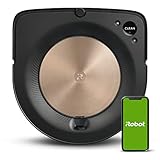



Neato D10 vs Roomba S9: Differences
Let’s get straight to the point: the Roomba S9 triumphs with a 4-2 score over the Roomba S9. Continue scrolling immediately for more detailed information!
Cleaning Performance
Winner: Roomba S9
Hard Floor
| Neato D10 | Roomba S9 |
|---|---|
| ≈ 99% | ≈ 92% |
The S9 performed superbly on my hardwood floor, clearing away almost all the debris with ease. Meanwhile, the D10 was okay on this surface type, leaving a visible amount of larger debris behind.
Carpets
| Neato D10 | Roomba S9 | |
|---|---|---|
| Low-pile Carpet | ≈ 89% | ≈ 99% |
| High-pile Carpet | ≈ 92% | ≈ 99% |
I also wanted to see how well these bots would pick up debris on carpets, and as I guessed, the S9 still passed my tests with flying colors. As for the D10, this one picked up the majority of the dirt, but there was still a small amount of debris left behind that it missed.
Hair Pet
| Neato D10 | Roomba S9 | |
|---|---|---|
| 5-inch Strands | ≈ 74% | ≈ 89% |
| 10-inch Strands | ≈ 54% | ≈ 78% |
Both the D10 and S9 did not exactly do a fantastic job of dealing with hair on my floor. They could readily collect a substantial amount of 5-inch hair but encountered difficulties with 10-inch strands. The S9 managed to prevent tangles better, thanks to the bristle-free design of their rollers.
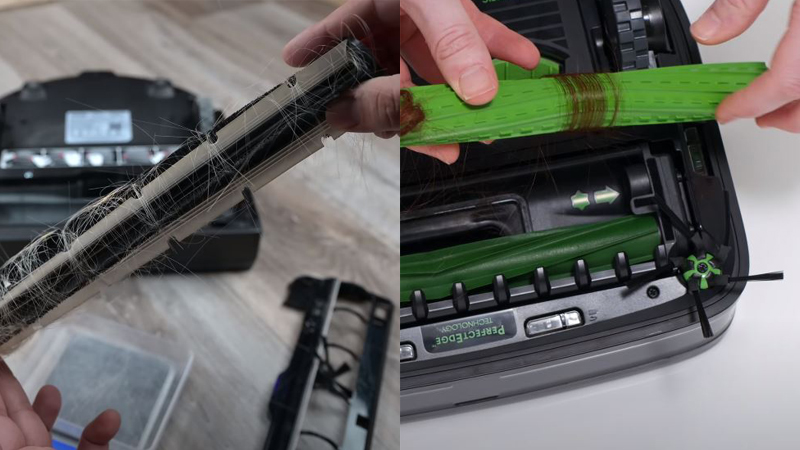
Design & Usability
Winner: Roomba S9
Dimensions & Weight
| Neato D10 | Roomba S9 | |
|---|---|---|
| Dimensions (W xH) | 13.2 x 3.99 inches | 12.25 x 3.5 inches |
| Weight | 8 lbs | 8.15 lbs |
The designs of the D10 and S9 distinctly differentiate them from the majority of other robot vacuums out there. Eschewing the conventional round-shaped frame, these bots are shaped like the letter D. This unique design grants them dual advantages: they can cover large areas in a single sweep and clean in corners and along the edges of walls better than their round-framed counterparts or at least that’s what the manufacturers try to tell you.
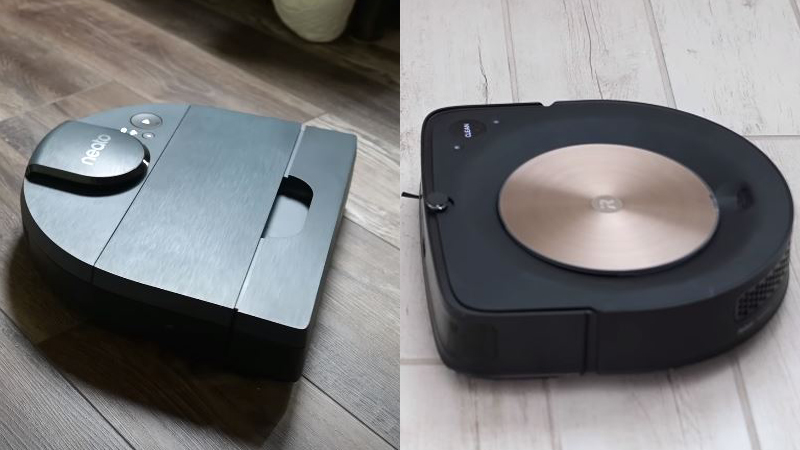
My real-world tests show that while the S9 excelled at cleaning along the edges of walls, the D10 didn’t exhibit superior performance compared to the disk-shaped robots I’ve tested. So it’s safe to say that the D-shape of the D10 is more iconic and aesthetically futuristic than a game changer in functionality.
The broad, flat front edge restricts these robots from effectively navigating through narrow spaces like gaps between chair legs. Fortunately, they are light enough to carry around rooms and floors with ease. A built-in handle on the Neato D10 makes it even easier.
Extractor & Side Brush
The D-shape frame also allows these little housekeepers to accommodate broader brush rollers. The D10 below has a single 11-inch roller situated along its flat frontal area. Neato calls it the Helix multi-surface brush roll and claims it is 50% quieter on hard surfaces than the Spiral Combo brush roll on its D8 predecessor. If you are a pet owner, I personally highly recommend adding its Spiral Combo brush to your arsenal since it prevents tangles better.
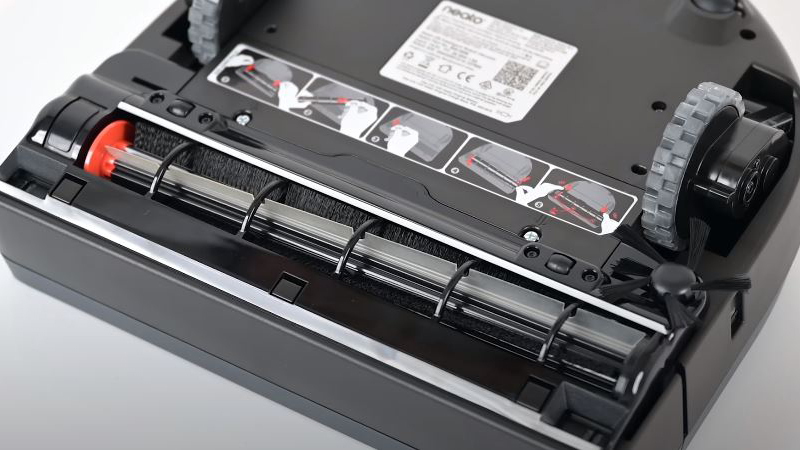
On the other hand, the S9 features a pair of rubber rollers measuring 9.5 inches each. It’s worth noting that they are bristle-free, so they aren’t prone to get tangled with hairs, threads, and other debris, requiring less frequent cleaning and maintenance. They can also be easily disassembled for deep cleaning.
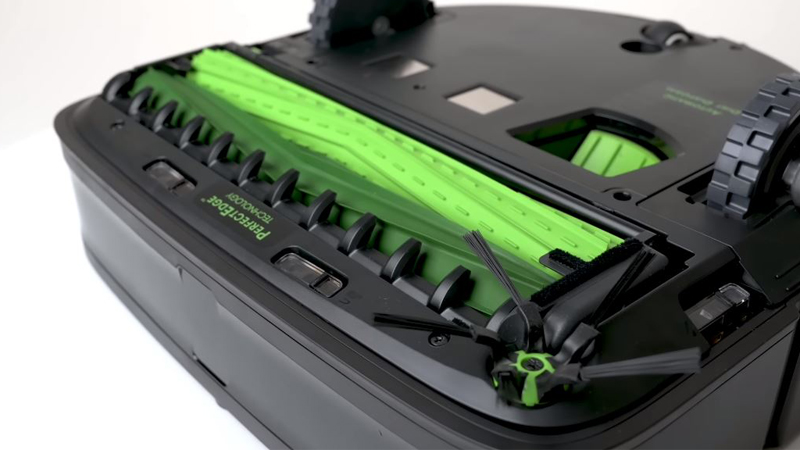
Speaking of the side brush, both the D10 and the S9 boast a 5-arm brush that spins 360 degrees to direct leftover particles toward the main cleaning path of the robot. But the one on the D10 is attached to the body via a magnet and located behind the main brush roller, allowing for easy removal, while the S9’s corner brush is situated at the front and is screwed to the frame, necessitating a screwdriver for detachment.
Navigation
These boys can learn and memorize the layout of your flat themselves without any fuss but with different navigation technologies: the D10 uses a built-in LiDAR sensor, while the S9 relies on a top-mounted vSLAM camera. Should these technical terms bewilder you, allow me to elucidate them in the simplest manner possible.
Employing LiDAR implies that the D10 doesn’t have any concealed dedicated cameras or microphones – it utilizes laser beams to survey its surroundings for mapping so that it can serve as a non-intrusive smart bot. Right off the bat, your privacy is absolutely protected. That means your privacy is completely safeguarded!
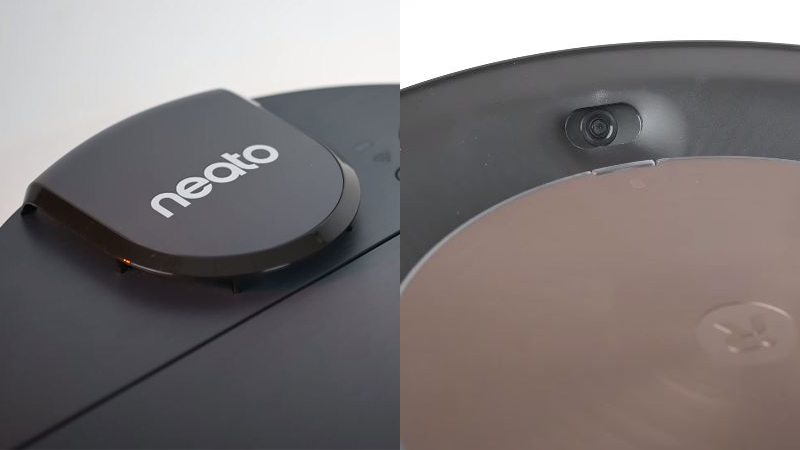
But what makes LiDAR a better navigation technology is its ability to generate a map of your space without necessitating numerous initial passes. My D10 requires only two cycles, and I’ve experienced other LiDAR-based models like the Roborock S7, which require just a single run. What’s more, this one can clean in dark zones.
On the flip side, the Roomba S9 requires adequate lighting to operate properly and requires about four runs to get the job done. There is a ‘training runs’ option in the iRobot app, which ensures that S9 doesn’t start cleaning until it has memorized the entire layout. Still, this one earned them brownie points for those residing in multi-story dwellings thanks to the ability to save up to 10 layouts, compared to the D10, which only supports three different floors.
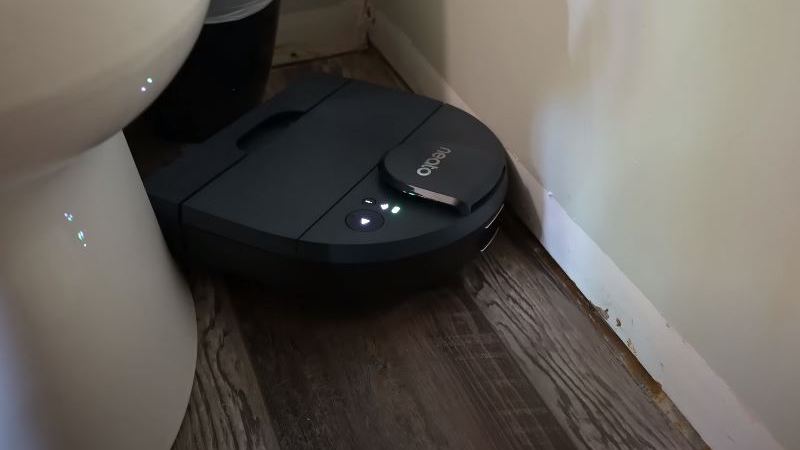
Then they methodically clean your floors in rows, provided the floors are devoid of any obstructions. Yes, these bots don’t have obstacle avoidance technology, rendering them unable to detect typical impediments such as power cords, toys, stray socks, and pet waste, nor can they automatically navigate around them. So if your floors tend to be cluttered and you prefer not to intervene with your robot during its cycle, it’s prudent to either clear any hindrances beforehand or opt for a robot vacuum endowed with AI-driven obstacle avoidance technology, like the Roomba j7+.
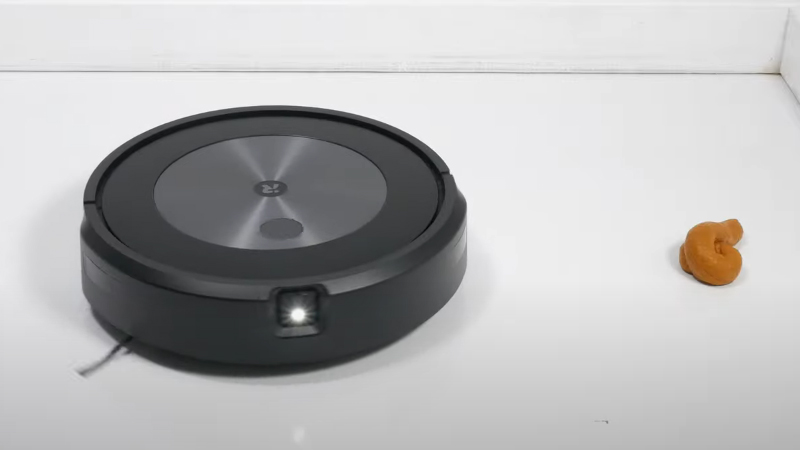
Battery Life
| Neato D10 | Roomba S9 | |
|---|---|---|
| Battery Life | ≈ 93–239 mins | ≈ 63–112 mins |
| Charging Time | ≈ 186 mins | ≈ 196 mins |
The D10 uses a 6,200mAh battery, giving it a longer battery life on a single charge compared to the S9 with a 5,200mAh battery. Both models feature a built-in indicator light, enabling a quick glance at their battery charge status, or alternatively, you can verify it through the app.
Frankly, I just care that they both have a “Recharge & Resume” function, meaning that when they come close to a low battery level, they will make their way back to the home charging base, where they power up before continuing their work – so you won’t have to recharge them manually. When positioning the home base, it should be aligned against a wall in a location with a strong Wi-Fi signal and should have at least one foot of unobstructed space on every side to enable the bot’s automatic return.
Control
Winner: Roomba S9
Manual Control
Both the Neato D10 vs Roomba S9 have two buttons for starting/ending cleaning and sending the robot to the charging station, but only the latter has a “Spot Cleaning” button. If you’re wondering, this button allows the S9 to clean a zone within a radius of about 3 feet.
App Connectivity
To set no-go zones or schedule cleanings, you need to have these bots connected to your phone via the respective apps: iRobot and MyNeato mobile apps (available for Android and iOS). These apps not only enable you to set cleaning modes and schedule cleaning sessions directly from your phone, but they are also compatible with assistant platforms like Amazon Alexa and Google Assistant for voice control.
Through these applications, you can instruct the D10 and S9 on which areas need more frequent cleaning and which ones are blocked off. You can also program them to only clean specific rooms or areas while skipping others. You’ll be promptly notified whenever components such as the filter or brush roll need replacement.
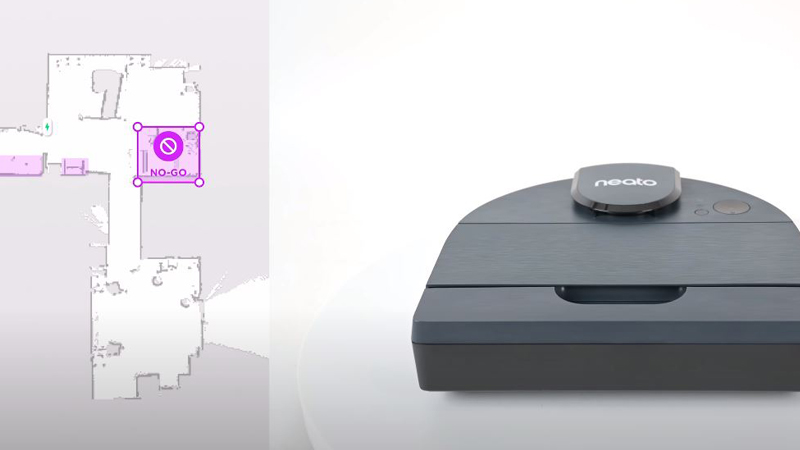
The iRobot app provides a “When I Leave Home” feature, which essentially signals the S9 to commence its duties each time you step out of the house with your phone. Additionally, the “Imprint Link” facilitates collaborative cleaning between the S9 and the Braava M6 mopping robot, allowing them to alternate in cleaning your home without requiring your intervention.
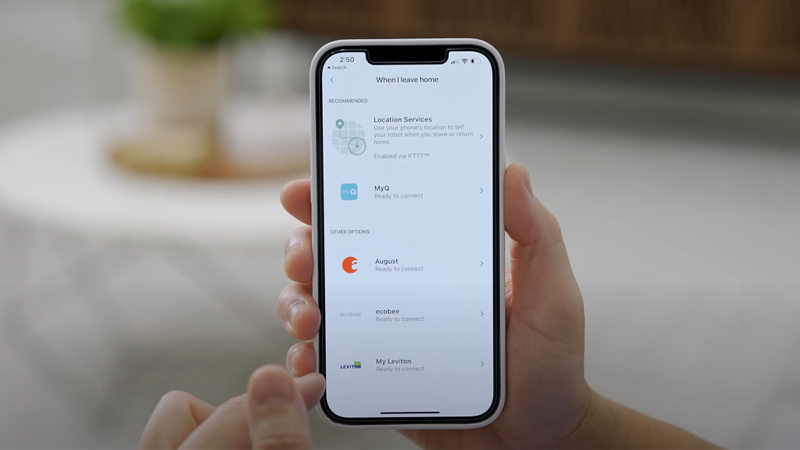
Cleaning & Maintenance
Winner: Neato D10
While the S9 has a small 0.5-liter dust tank, the D10 houses a 0.7-liter one, implying less frequent emptying is needed for the latter. They are fitted with HEPA filters promised to trap up to 99.97% of dust particles and allergens, which is great for larger households or those with pets or children that need a more thorough clean.
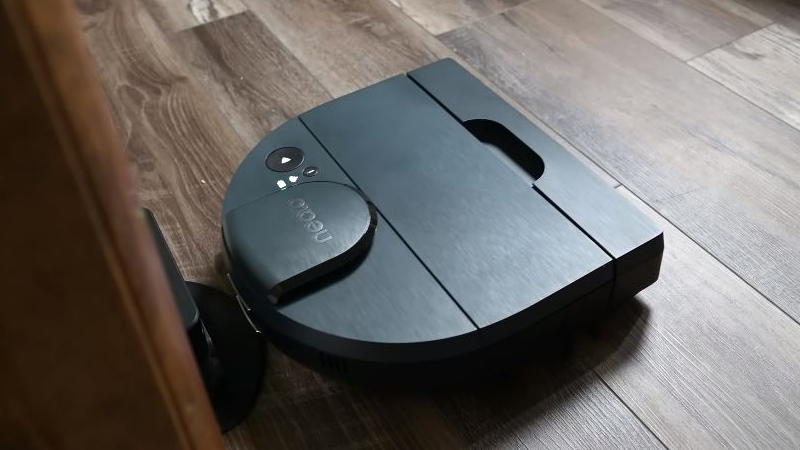
They both come with a small base for recharging and lack an auto self-emptying feature, necessitating manual emptying of their bins. Lifting these bins from the top of the robot for emptying is straightforward but can be messy, as dust particles are prone to scattering upon opening the bin door. Therefore, conducting this task outdoors is advised if feasible.
If you feel uncomfortable with this, you are not alone. After all, who wants to spend their hard-earned money on a robot and then have to keep an eye on it? Unfortunately, even if you want to spend more money on a clean base, you won’t find one that’s compatible with it. As for the S9, it can pair with a clean tower, but you need to buy it separately or get it as part of the S9 Plus.
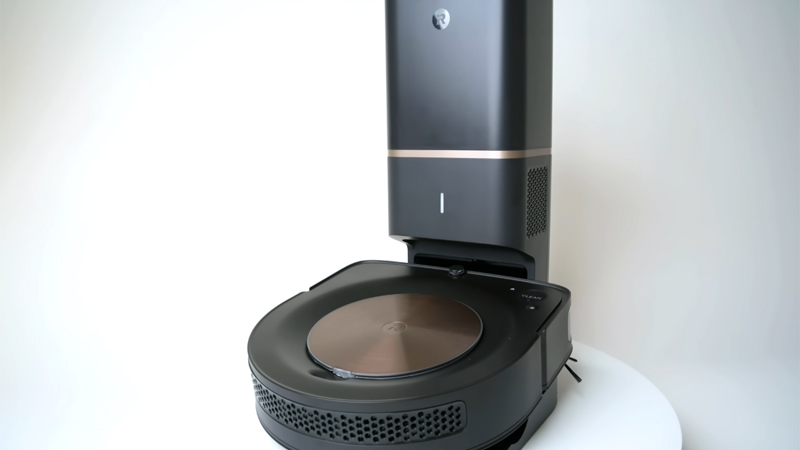
Other Features
Winner: Tie
Noise
| Neato D10 | Roomba S9 | |
|---|---|---|
| Working | ≈ 61-75 dB | ≈ 60-74 dB |
| Self-Emptying | None | None |
Regardless of cleaning mode, both the Neato D10 vs Roomba S9 are quite loud. They are quieter than your average manual vacuum and you can still have a conversation with others when they are running, you may find a need to increase the TV volume slightly.
If noise sensitivity is a concern for you, it could be advantageous to schedule cleaning sessions when you are not present in the home, while preparing breakfast, or during your nighttime shower routine. Bear in mind that the S9 has the capability to be programmed to meticulously clean your home each time you exit, courtesy of the “When I leave home” feature.
Mopping Ability
The Neato D10 vs Roomba S9 are primarily high-end robotic vacuums, and they don’t include mopping capabilities. I’ve evaluated multiple hybrid robots, and the Roborock S7 MaxV stands out as one of the most satisfying.
Quick Rundown Of Roomba S9
- DEEPEST CLEAN - With 40X the suction power, the superior 3-Stage Cleaning System lifts, loosens, then eliminates debris & pet hair from deep within your carpets. Increases suction to clean even deeper into carpets with power boost technology.
- DETAILED POWERFUL CLEAN - PerfectEdge Technology with advanced sensors & a specially designed Corner Brush optimize cleaning deep into corners & along edges. Ideal for homes with pets. 30% wider Dual Rubber Brushes don't get tangled with pet hair.
- GUIDED BY SERIOUS SMARTS - With vSLAM navigation, the s9 learns the layout of your home & builds personal Smart Maps, enabling it to expertly clean & navigate in neat, efficient rows. If it’s running low on battery, it recharges & resumes cleaning.
- VACUUMS MESSES IN THE MOMENT - Cleaning crumbs is now as easy as “Roomba, clean under the kitchen table.” A simple request to your voice assistant or via the app enables the s9 to clean messes for you, right when they happen.
- COMPLETE CONTROL OF YOUR CLEAN - With Smart Mapping, your robot knows your kitchen from your living room, so you can decide where it cleans & when. & with Keep Out Zones, your robot knows to avoid sensitive areas like pet bowls or play areas.
Quick Rundown Of Neato D10
- Neato D10 vacuums longer than ever. Up to 300 minutes runtime covering up to 2,700 sq.ft. on single charge. Optimize performance and battery life by using energy-saving Eco mode for general vacuuming, high-performance Turbo mode for areas that need more powerful clean and Max mode for deepest clean..Power consumption does not exceed 50W. 6200mAH 14.4V high-capacity lithium-ion battery.
- Neato's D-shape design reaches dirt where round robots can't—in corners and along walls with its LaserSmart LIDAR technology, the same technology used in self-driving vehicles, to map and navigate your home with precision, leaving your carpets with those satisfying straight vacuum lines.
- Customize your floor plan with Zones that define areas to clean more frequently—or No-Go Zones to identify areas to avoid (like a child's play area or pet food bowls).
- Clean with a Helix Multi-Surface Brush that’s up to 70% bigger than those round robots and 50% quieter on hard surfaces. It’s effective on any surface—hardwood, carpet or tile—so it’s great for any home. Neato’s industry-leading dirt bin, at 0.7 liters, means less frequent emptying.
- Exclusive Max Mode for maximum clean. Go beyond Eco and Turbo mode for an even deeper clean with maximum pickup—Neato D10 offers 60% greater dirt pickup than D3 & D5 (tested in internal labs).
Product Videos
Related Articles to Roomba S9
- Comparing The Roborock S7 Vs iRobot S9: Which Prevails?
- iRobot Roomba 980 Vs S9: A Detailed Comparison
- A Detailed Face-Off Competition Of Roborock S8 Vs Roomba S9
- iRobot S9 Vs Shark IQ Robot: Which One Has My Vote?
- iRobot I7 Vs S9: Which High-End iRobot Roomba is Better?
- Dyson 360 Heurist Vs Roomba S9 Robot Vacuum Detailed Comparison
- iRobot S9 Vs S9+ Detailed Comparison: Are There Any Differences?
- Roborock S7 MaxV Vs iRobot S9: A Head-To-Head Comparison
References:
- Roomba S9: https://www.irobot.com/en_US/roomba-vacuuming/robot-vacuum-irobot-roomba-s9-plus/S955020.html
- Neato D10: https://neatorobotics.com/products/neato-d10-intelligent-robot-vacuum

Richard B. Schmidt is a prominent figure in the vacuum cleaner industry, boasting over 15 years of expertise. Armed with a Robotics Engineering degree from Northeastern University and a Master’s in Consumer Science from Harvard, his unique blend of technical knowledge and consumer insights positions him as a sought-after authority in vacuum cleaner evaluation. Richard’s career began at Dyson, where he contributed to the development of innovative vacuum models. Transitioning to advocacy and reviews, he co-founded the first Vacuum-focused blog in 2008, offering comprehensive analysis and user guides for various vacuum cleaners. In 2020, he founded RoboMop.net, providing ongoing insights through columns and buyer’s guides.
